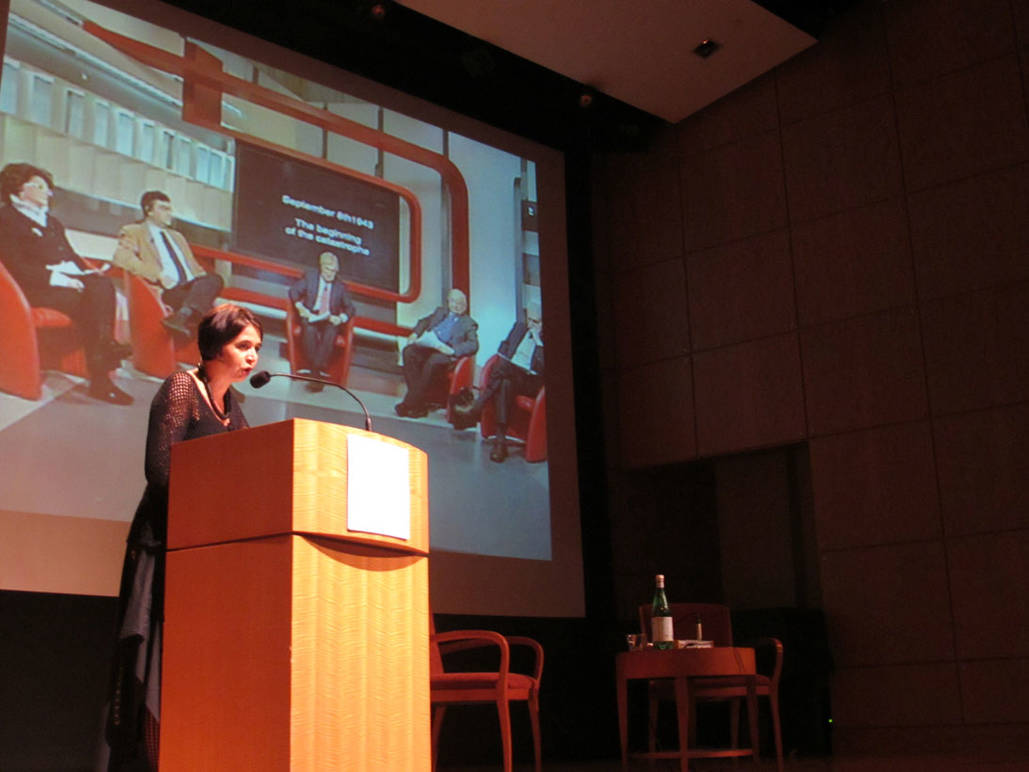Keeping Memory Alive
An Auschwitz survivor, Primo Levi argued that neither time nor distance should allow vibrations of the Holocaust to be silenced. Before his death in 1987, Levi placed an indelible mark in the canon of Holocaust literature: "We must be listened to: above and beyond our personal experience, we have collectively witnessed a fundamental unexpected event, fundamental precisely because unexpected, not foreseen by anyone. It happened, therefore it can happen again: this is the core of what we have to say. It can happen, and it can happen everywhere."
Over this past week, named the “Week of Remembrance,” Italian organizations throughout the city hosted several events to honor those who suffered, perished, and especially those who persevered and survived the Nazi concentration camps. NYU’s Casa Italiana Zerilli-Marimò, the John D. Calandra Italian-American Institute at CUNY, the Italian Academy at Columbia University, and the Italian Cultural Institute, have collaborated to give due respect to this historical moment.
Sunday afternoon, January 30, 2011, the Primo Levi Center, located at 15 W 16th Street, dedicated the afternoon to commemorate, educate, and discuss the events surrounding the Italian experience during the Holocaust; recognizing those who partook in the Antifascist movement and other Resistance movements.
The defining element of Sunday’s event was the international discussion made possible by the Primo Levi Center, RAI President Paolo Garimberti, and all the voices involved. The audience, filling nearly every seat in the auditorium, became witnesses to the video-call between Italian intellectuals, historians, and journalists speaking from Rome, Turin, Pisa, Geneva, and Milan. Natalia Indrimi, Executive Director of the Primo Levi Center, prefaced the discussion by saying “Today we want to give context to the memory of those involved…to create a sense of the demolition of civil liberties, and tell the story of those who opposed it from the beginning.”
Indrimi led the discussion by engaging notable voices such as Liliana Picciotto (Centro di Documentazione Ebraica Contemporanea, Milan) Paolo Bologna (Associazione Nazionale Partigiani), Anna Foa (University of Rome La Sapienza), Alberto Rosselli (son of co-founder of Giustizia e Libertà, Nello Rosselli), and Anna Bravo (University of Turin).
The panel dwelved on the early opposition to Mussolini's Regime, the exodus to France of many political dissenters, and the movement Giustizia e Libertà, whose founders, the Rosselli brothers, were murdered in 1937. The hit, ordered by the Italian Secret police, was executed by the French Cagoule, an extremist right-wing underworld group. The discussion was followed by the screening of "The Rosselli Case," the film directed by Stella Savino, narrated by Alberto Rosselli and produced by Rai, DocLab and Fox Channel Italy.
The forum served to educate all those present, but most importantly to focus international perspectives and experiences into one room. It was made clear that the root of the Antifascist movement was a remarkable human element. Most of those involved in the civil resistance risked their own lives to protect the rights and freedom of the Italian people. With a reverent tone, Professor Anna Bravo revealed that these men and women were often unarmed, demonstrating their moral courage, bravery and virtuous character. In our modern world, civil resistance is rarely characterized as such.
Others agreed, during the virtual round table, that Antifascists and others in the Resistance movement were driven by resilience. As World War II and the events surrounding the Holocaust represent the cruelest display of human behavior in world history, recognition is required. This past Sunday, the Primo Levi Center brought this education to New York. As Indrimi stated, “When we look at this history and at the human element, the personal stories, we understand our collective accountability better and something we cannot forget.”
RAI’s Paolo Garimberti, speaking from RAI Roma reminded the audience that today the primary focus must be to continue educating the younger generations of Italians, both Jewish and non-Jewish, that this is a vital thread in Italian history. Consul General Francesco Maria Talò agreed strongly, stating that “When we speak about the Day of Remembrance, our children should be our focus; we have to continue to make this effort to be more and more active.” While the Italian-Jewish community is not huge in New York City, education must continue to be the cohesive element among them and their neighbors.
In his closing remarks, Talò emphasized that “all Italians and Italian Americans must take responsibility for all aspects of our history — not simply the positive moments”. Certainly, it is right to be proud that the Italian community congregated in remembrance of its ancestors. And yet, as Talò stated, “This pride should be small when compared to the shame we feel for this part of our history.”
With a conscious effort, the Italian community in Italy and abroad set aside time during this “Week of Remembrance” to align themselves with the shameful events of Italian history. Through continued education, Levi’s words will echo in the ears of today’s young generations, and those of the future. “It can happen again, and it can happen everywhere;” perhaps, our greatest weapon against that evil will be remembrance.








































i-Italy
Facebook
Google+
This work may not be reproduced, in whole or in part, without prior written permission.
Questo lavoro non può essere riprodotto, in tutto o in parte, senza permesso scritto.